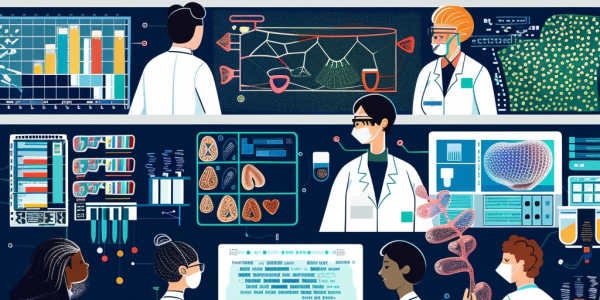Barriers to Lung Cancer Screening and the Importance of Early Detection
Learn about the importance of lung cancer screening and the barriers that hinder its widespread adoption. Early detection is key in improving patient outcomes, but low screening rates among at-risk populations pose a challenge. Addressing factors like lack of awareness, physician reluctance, insurance coverage, and stigma is crucial in increasing screening uptake and saving lives.
New Gene Linked to Rare Lung Disease PCD Identified by Scientists at University of Leicester
University of Leicester scientists have identified a new gene, tubulin (TUBB4B), linked to primary ciliary dyskinesia (PCD), shedding light on the genetic mechanisms underlying this rare lung disease. The research, published in Science, reveals diverse clinical manifestations and the impact of mutations on tubulin protein function. This breakthrough has the potential to enhance rapid diagnostic techniques and inform new therapeutic approaches for PCD patients.
Radiologists’ Role in Smoking Cessation Efforts
Recent studies have shown that radiologists can significantly impact patients’ willingness to quit smoking by providing onsite smoking cessation support during CT lung cancer screening appointments. Research revealed that a brief consultation with a radiologist resulted in nearly 90% of patients feeling more motivated to quit smoking. Tailored smoking cessation programs are crucial to address the needs of different patient groups, with potential for integration into national lung cancer screening programs to reduce smoking-related morbidity and mortality globally.
Groundbreaking Discovery: Immune Cell Susceptibility to SARS-CoV-2 Infection
Stanford Medicine researchers have made a groundbreaking discovery regarding the susceptibility of a specific type of immune cell to SARS-CoV-2 infection, the virus responsible for COVID-19. This unexpected revelation has significant implications for understanding the medical consequences of COVID-19 and opens up new possibilities for preventing SARS-CoV-2 infections from progressing into life-threatening conditions.
New Therapies for COPD Set to Revolutionize Treatment Paradigm in 2024
Learn about the potential paradigm shift in COPD treatment with the imminent entry of new therapies such as Dupixent and Ensifentrine, both of which have successfully met their trial endpoints and are projected to revolutionize the treatment paradigm for COPD. GlobalData anticipates Dupixent to achieve total sales of $21.4 billion globally by 2029, while Ensifentrine is forecast to generate sales of $1.1 billion by the same year. With promising results from two phase 3 clinical trials, Dupixent has the potential to address the current gap in the COPD market due to the absence of biologics.
Lung-Brain Communication in Sickness Response
Groundbreaking research reveals direct communication between lungs and brain during infection, challenging traditional understanding of sickness response. Study in mice shows neurons in lungs alert brain about infections, leading to symptoms through nervous system activation. Gender differences in sickness behavior observed, shedding light on potential gender disparities in illness experiences. University of Calgary researchers emphasize significance of findings for treatment of respiratory infections and chronic lung conditions.
Researchers Developing ‘LungVax’ Lung Cancer Vaccine with £1.7M Funding
Researchers at the University of Oxford, the Francis Crick Institute, and University College London have received £1.7 million in funding to develop a groundbreaking lung cancer vaccine called ‘LungVax’. The vaccine aims to train the immune system to recognize and attack abnormal lung cells, potentially saving thousands of lives. Using technology similar to the successful Oxford/AstraZeneca COVID-19 vaccine, the team will first conduct lab tests before moving on to clinical trials. This project marks an important step towards a future where lung cancer is much more preventable.
Growing Mini Organs from Amniotic Fluid Cells Could Revolutionize Prenatal Medicine
The potential to grow miniature organs from cells found in amniotic fluid could revolutionize prenatal medicine, offering the possibility of treating health defects in fetuses before they are born. Researchers have successfully cultivated mini organs from tissue-specific stem cells extracted from amniotic fluid during active pregnancies, a groundbreaking development that could pave the way for monitoring and treating congenital conditions before birth.
Man who spent 70 years in an iron lung passes away at 78
Paul Alexander, also known as ‘Polio Paul’, spent 70 years in an iron lung after being paralyzed by polio at the age of six. His remarkable journey and resilience in the face of adversity serve as an inspiration to many, and his legacy will continue to inspire future generations.
Health Care Disparities for Inuit with Lung Cancer in Nunavik
A recent study in the Canadian Medical Association Journal revealed disparities in lung cancer outcomes between Inuit inhabitants of Nunavik and Montreal. The findings suggest systemic issues within the health care system, rather than genetic predisposition, as the cause. The study authors recommended measures to improve survival, including tailored smoking cessation and prevention services, accessible lung cancer screening, and enhanced lung health services in the region.










